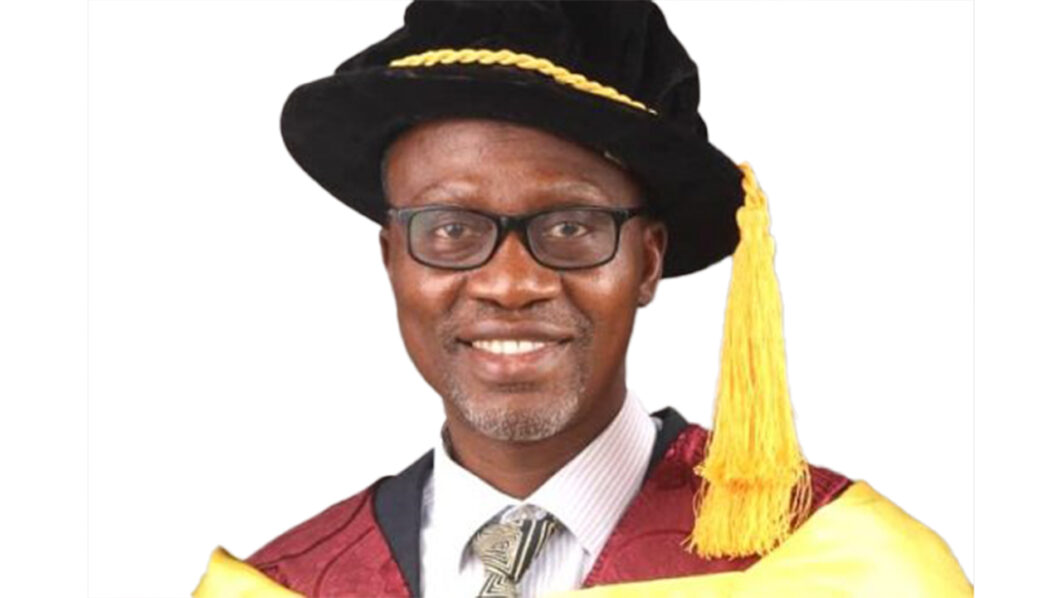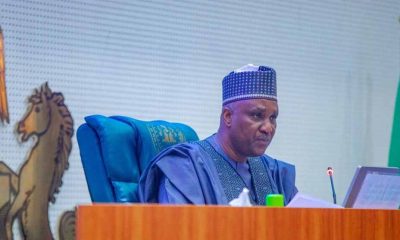Education
NUC disowns NBTE conversion of HND to degree programme

NUC disowns NBTE conversion of HND to degree programme
The National Universities Commission (NUC) has disowned a programme being floated by the National Board for Technical Education (NBTE) which aimed at converting Higher National Diploma (HND) to university’s degree.
Acting Executive Secretary of NUC, Chris Maiyaki, in a statement, made available to newsmen in Abuja on Saturday, described the purported one year top-up degree programme in Nigerian Polytechnics as not feasible.
Maiyaki, who personally signed the statement, said the existing dichotomy between first degree and HND has not been abolished even as universities and polytechnics have their individual unique programmes which would pose a challenge to such conversion scheme.
The statement reads in full :
“The attention of the National Universities Commission (NUC) has been drawn to the news (online) that the National Board for Technical Education (NBTE) has officially introduced a one year top-up degree programme in Nigerian Polytechnics to enable holders of the Higher National Diploma (HND) to convert their certificates to the first degree with foreign accredited universities.
The online news, which was credited to the Executive Secretary of the NBTE, Prof Idirs Bugaje and the Board’s Head of Media Unit, Mrs. Fatima Abubakar, revealed that the action was in furtherance of the advocacy for the removal of the existing dichotomy between degree holders and HND graduates in their various places of work, and to enhance the beneficiaries’ opportunities for further studies.
READ ALSO:
-
Ferrari begins accepting crypto as payment for its cars
-
Tinubu, Sultan, Bayero, Oloyede, 11 other Nigerians listed among 500 world influential Muslims
-
Euro 2024: Kylian Mbappe scores twice as France beat Netherlands to seal qualification
The NUC wishes to inform the Management of the NBTE and the general public that the “Bill for an Act to Abolish and Prohibit Dichotomy and Discrimination between First Degree and Higher National Diploma in the Same Profession/Field for the Purpose of Employment, and for Related Matters”, which was passed by the 9th National Assembly in 2021, is yet to be assented to by Mr. President and Commander-in-Chief of the Federal Republic of Nigeria. So, even though agitation continues to grow for the abolition of the dichotomy in Nigeria, there is, at the moment, no law that has removed the dichotomy between a university degree and the HND.
Both the NUC Establishment Law (CAP N81, LFN, 2004) and its Operational Law: Education (National Minimum Standards and Establishment of Institutions) Act, CAP E3 LFN, 2004) vest in the Commission the powers to superintend and regulate university education in Nigeria, lay down minimum academic standards in the nation’s Universities and other degree-awarding Institutions, and accredit their programmes. Thus, the Commission is the only constitutionally empowered regulatory agency for university education in Nigeria.
READ ALSO:
-
Insecurity: NSCDC deploys undercover agents to schools
-
Ondo Assembly halts impeachment process against Aiyedatiwa
-
Fake lawyer who won 26 cases against trained lawyers arrested
Pursuant to the sustained commitment of the NUC to the development of a balanced, well-coordinated and productive University System that guarantees the delivery of quality education relevant to national development, and in the face of global competitiveness, the Commission wishes to state, categorically, that:
The place of technical education, the world over, is unique. Thus, in most higher education systems, Polytechnics co-exist side by side with Universities for the purposes of producing critical human resources, based on their peculiarities and in tandem with the the goals for which they were established, abinitio;
The university degree awarded by the Nigerian University System or any cognate Institution, is not the same as the HND awarded by Polytechnics in Nigeria. In the Nigerian higher education space, the processes, contents and methods required for the acquisition of a university degree are substantially different from those needed for HND programmes;
At the post-graduate level, the requirements for admission into any Master’s degree programme in Nigerian Universities for candidates with HND are, among others, the acquisition of a Postgraduate Diploma (PGD) from a recognised University in an area relevant to that for which the Master’s admission is being sought. To this end, it is implicit that beneficiaries of the NBTE’s Top-Up Programme shall be subjected to extant admission requirements by Nigerian Universities, should they desire to further their studies in the NUS, and
The unsuspecting general public and all relevant Ministries, Departments and Agencies (MDAs) should, please, note that the NUC is not a party to and, indeed, disavows the so-called Top-up Scheme, being concocted by the NBTE.
In the light of the above, the advice of the NUC is that the NBTE should focus on its core mandate and desists from introducing programmes that are outside its jurisdiction, and not supported by any law in Nigeria. The Commission does not entertain any intrusion into its lawfully assigned mandate.”
NUC disowns NBTE conversion of HND to degree programme
Education
Canadian province opens 2025 government internship programs for international students

Canadian province opens 2025 government internship programs for international students
The Government of Prince Edward Island (PEI), a Canadian province, is inviting applications for its 2025 Internship Program.
This opportunity allows international students and recent graduates to gain experience working within the provincial government.
The internship program, which is a one-year temporary job assignment, offers participants the chance to build skills and gain professional experience in various PEI government departments.
According to the Prince Edward Island, the program also provides access to workshops, networking events, and other professional development resources to help interns grow in their careers.
The PEI internship program is set to begin in May 2025 and runs for one year. Interns will have the opportunity to work in multiple government departments, participating in workshops and professional development activities. These include career planning, conflict management, emotional intelligence, and training on equity, diversity, and inclusion (EDI), as well as anti-racism in the workplace.
READ ALSO:
- Police kill three suspected kidnappers, arrest two others in Imo
- Lagos govt seals Coca-Cola, Guinness, Peak Milk
- Makinde speaks on Sharia court controversy in Oyo
Additionally, the program provides a platform for;
- Networking,
- Helping interns to connect with government professionals and
- Build valuable relationships within the public service sector.
- Interns will also receive support to help them understand eligibility for government jobs and navigate potential future opportunities in the public service.
Eligibility and application requirements
To be eligible for the program, applicants must have completed a;
Post-secondary program within the past 36 months. Additionally,
- Candidates should be Canadian citizens, permanent residents, or eligible for a Canadian work permit.
- International students who meet these requirements are encouraged to apply.
Applications are currently being accepted, and interested candidates must submit their applications through the official PEI Internship Program Portal.
Interviews for shortlisted candidates will be held on March 4th and 5th, 2025. The internship program will begin in May 2025.
How to apply and important dates
Applicants can apply online through the official PEI Internship Program Portal.
Additional details, including position descriptions and participating departments, are available on the official website of the Government of PEI.
Canadian province opens 2025 government internship programs for international students
Education
Two ex-VCs, JAMB registrar to attend Prof. Ibraheem UNILAG inaugural lecture Wed

Two ex-VCs, JAMB registrar to attend Prof. Ibraheem UNILAG historic inaugural lecture Wed
- History beckons as Mass Comm alumnus delivers inaugural lecture Wed
History will be made this week Wednesday December 18, 2024 at University of Lagos when an alumnus of the university’s Mass Communication Department, Ismail Adegboyega Ibrahim, professor of journalism and communication studies, will deliver inaugural lecture as a lecturer of the department.
Ibraheem, a 1990 graduate of the university, returned to the institution in 2011 as a lecturer.
It is the first time a former student of the department will be delivering an inaugural lecture 58 years after its establishment.
Ibraheem, director of International Relations, Partnerships and Prospects at the UNILAG, will speak on “Casino Journalism and the End of History.”
The university’s Vice-Chancellor, Professor Folasade Ogunsola, will chair the event, according to a statement from the institution.
Two former vice-chancellors of the university, Professor Rahamon Bello and Professor Oluwatoyin Ogundipe, are expected to grace the lecture along with the Registrar of the Joint Admissions and Matriculation Board (JAMB), Professor Is-haq Oloyede, among others.
The lecture is scheduled for 4pm at the J.F. Ade. Ajayi Auditorium, UNILAG, Akoka.
Members of the University Community and general public are invited to join the lecture physically or virtually via Zoom Meeting ID:862 1255 2361.
Education
Austria offers scholarship grant for int’l postgraduate, research students

Austria offers scholarship grant for int’l postgraduate, research students
The Republic of Austria is offering an opportunity for international postgraduate students, PhD candidates, and postdoctoral researchers through the Ernst Mach Scholarship 2025.
Managed by OeAD-GmbH, Austria’s agency for education, this scholarship aims to support talented individuals in advancing their academic and research careers in Austria.
Details of the scholarship program
According to OeAD, the Ernst Mach Scholarship is open to students and researchers from various academic disciplines. This includes areas such as;
- Natural sciences
- Technical sciences
- Human medicine
- Health Sciences
- Agricultural sciences
- Social sciences
- Humanities, and arts.
The scholarship provides funding for semester or one-year grants, with research grants lasting from one to nine months, making it accessible to a broad range of applicants.
Benefits of the Ernst Mach scholarship
The scholarship offers numerous benefits to successful applicants.
- Recipients will receive a monthly stipend of €1,300 for the duration of their stay in Austria.
- Accommodation assistance is available, with affordable housing options ranging from €330 to €800 per month.
- OeAD will also provide administrative support to help applicants find suitable housing.
READ ALSO:
- Afe Babalola gets court order banning publication, sale of Dele Farotimi’s book
- Over 50 nuisance taxes will be scrapped — FG
- BREAKING: Blackout as National grid collapses again, 12th time in 2024
Grant holders will receive guidance on obtaining health insurance accepted in Austria, with a cost ranging from €55 to €200 per month. The scholarship also waives tuition fees at public universities, further reducing the financial burden on participants.
A travel subsidy of up to €1,200 is available for applicants from eligible developing countries, with travel invoices required for reimbursement. Moreover, recipients will have the opportunity to build valuable connections with top researchers and institutions in Austria, which can significantly enhance their academic and professional networks.
Eligibility criteria for applicants
The Ernst Mach Scholarship is open to early-career academics who are passionate about advancing their research. To be eligible, applicants must be;
- Postgraduate students pursuing a PhD outside Austria or postgraduates and postdoctoral researchers looking to conduct research in Austria.
- Additionally, postdocs employed at universities outside Austria are also eligible to apply.
- Applicants must be 35 years old or younger (born on or after October 1st, 1989) and should not have lived, studied, or worked in Austria for more than six months prior to applying.
- Proficiency in English or German is required to ensure effective communication during the research process.
How to apply for the Ernst Mach Scholarship
To apply for the Ernst Mach Scholarship 2025, interested individuals must visit the official OeAD-GmbH website.
The application deadline is February 1st, 2025. Applicants should ensure that they meet the eligibility requirements and submit all required documents before the deadline.
Austria offers scholarship grant for int’l postgraduate, research students
-

 Auto2 days ago
Auto2 days agoLSM MD extols founder’s qualities after latter posthumous industry award
-

 Business3 days ago
Business3 days agoBe creative, monarch, others challenge Muslim professionals on economic revival
-

 Entertainment2 days ago
Entertainment2 days agoMultiChoice announces free access to all DSTV channels for 3 days
-

 metro3 days ago
metro3 days agoJigawa State governor loses son 24 hours after mother’s death
-

 News2 days ago
News2 days agoNigeria Customs Service begins 2025 recruitment [How to apply]
-

 metro2 days ago
metro2 days agoHeavy security in Ilesa as ex-Osun deputy gov emerges new Owa-Obokun
-

 metro2 days ago
metro2 days agoLagos Imam to Tinubu: You haven’t disappointed us
-

 metro2 days ago
metro2 days agoDangote, Tinubu, Lookman named among 100 most influential Africans in 2024 (Full list)











